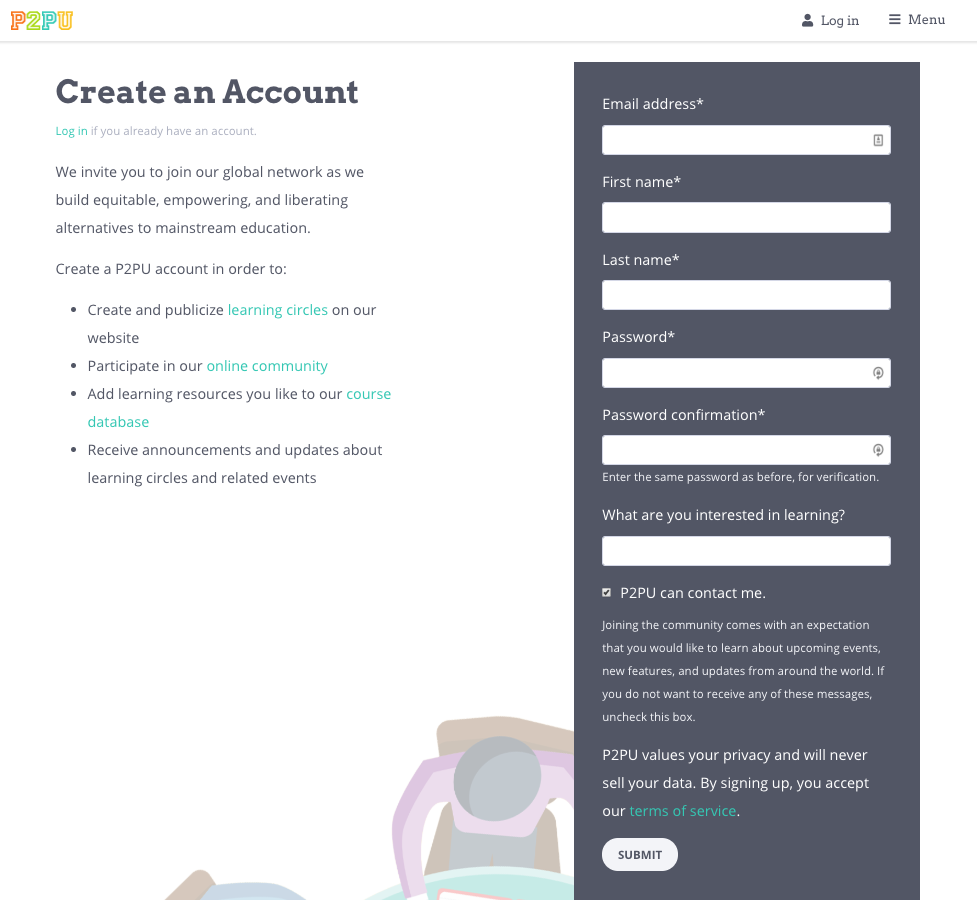Introduction¶
What is a learning circle?¶
A learning circle is a group of people who meet face-to-face to learn something together. Every learning circle has a facilitator, who help to organize meetings and create an atmosphere of peer-to-peer learning. Facilitators do not need to be subject experts; the expertise comes from the online course and the community of learners.
This manual is intended primarily for familiarizing yourself with P2PU’s software tools. Please consider these additional resources as well:
There are a number of facilitation resources available at https://www.p2pu.org/en/facilitate/
The free, online courses that learning circles have used in the past are available at https://www.p2pu.org/en/courses/
Our online community lives at https://community.p2pu.org
Tools for learning circles¶
When learning circles first began in Chicago in 2015, we didn’t have any tools and software. We just worked with librarians to find online courses and helped them become better facilitators. Over time, as the project has grown, we have iteratively developed a number of tools and resources to create an online ecosystem for learning circle facilitators. These tools are designed to improve the experience for facilitators and learners alike. On the one hand, we aim to make organizing face-to-face meetings easier by simplifying promotion, sending reminders, aggregating data, etc. On the other hand, we seek to create a strong, networked, community where a learning circle in one city can benefit, in a small way, from the fact that learning circles are also happening elsewhere. Learning circles have been successful so far not just because we have developed a single resource, but because there is a vibrant community of practice that has formed around a series of tools and resources.
Our tools address the needs of three different groups:
- Learners. People participating in learning circles.
- Facilitators. People facilitating learnig circles.
- Organizers. People organizing several learning circles across a town, city, or country. (Often the organizer is also a facilitator).
Learners can:¶
- Browse learning circles available in their area.
- Sign up for a learning circle.
- RSVP for weekly learning circle meetings.
- Complete a survey on their experience taking the learning circle.
- Receive an end-of-learning circle report from their facilitator.
Facilitators can:¶
- Use a step by step dialog to guide them through creating a learning circle.
- See who signed up, when meetings are scheduled, who can come, etc.
- Send messages to learners.
- Customize weekly reminders.
- Capture feedback after a meeting to gather and share reflections.
- Complete a survey on their experience facilitating a learning circle.
- Generate a report at the end of the learning circle.
Organizers can:¶
- See feedback from facilitators on weekly meetings.
- See what meetings are happening each week.
- Receive weekly updates on what happened in learning circles the previous week.
- Manage learning circles and facilitators.
Using the tools¶
Learners do not need a P2PU account in order to join a learning circle.
To faciltiate or organizse learning circles, you’ll first need to create a P2PU account, which you can do from the P2PU homepage.

After setting your password you will be logged in and redirected to your learning circle dashboard.
The tools are hosted online and can be accessed from www.p2pu.org
All the source code is release under the MIT license and can be found on GitHub.
Hosting your own instance¶
You need to be familiar with using the linux command line and setting up accounts on the web. You can find all the information you need to do so here.
If you’re uncomfortable doing this on your own, or would simply prefer paying someone else to do this, you can reach out to P2PU and we can talk about setting this up for you.
You can always ask for support on our forums should you get stuck at any time.
For more information on using the tools from a facilitator or organizer perspective, you can skip over to the facilitator user guide
Support¶
If you have any questions, encounter any problems or need to do something that is not addressed above, you can contact us at support@p2pu.org or on our forum.